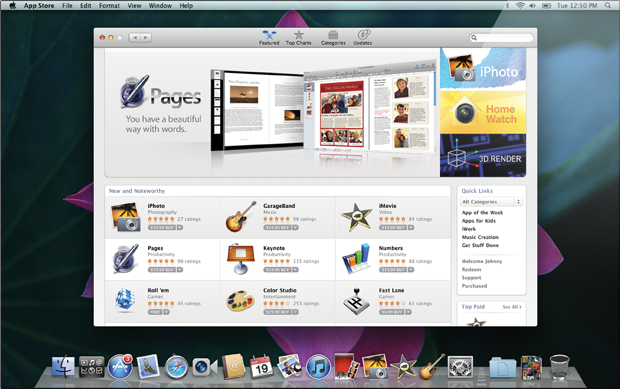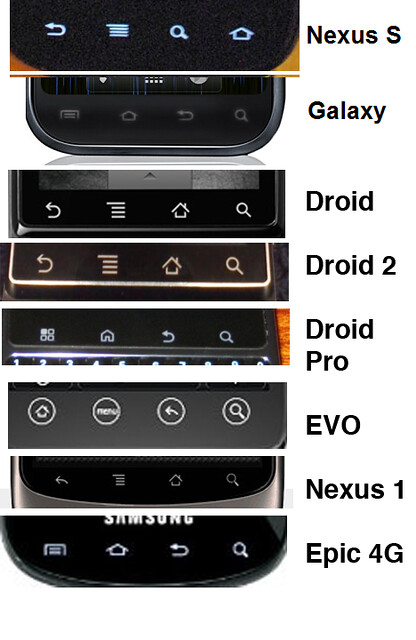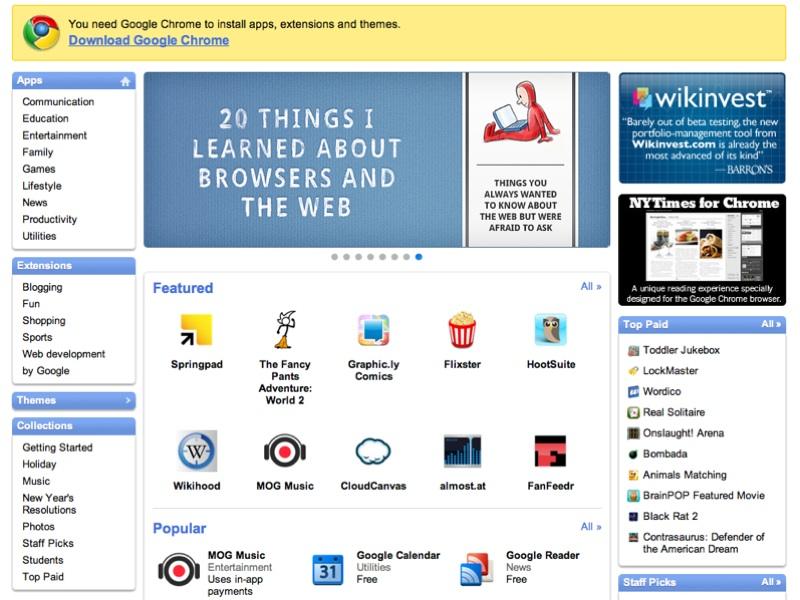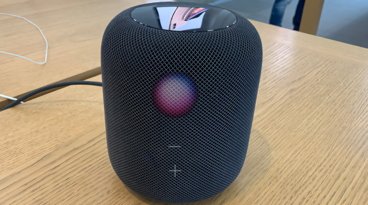Google delays netbook plans for Chrome OS to mid 2011
In an announcement earlier today, Google noted that its free Chrome browser, based on the WebKit open source project maintained by Apple, has tripled from 40 million to 120 million users. The Chrome browser is the basis for Google's forthcoming Chrome OS, which pairs the Linux kernel with a web-based app environment.
Google originally intended to ship Chrome OS on both Intel x86 and ARM-based netbooks by the middle of 2010 in a parallel effort to the company's Android operating system, which uses native and Java-like apps rather than being a web-based platform.
Chrome OS imagines an iPad-like future
"Google Chrome OS is being created for people who spend most of their time on the web, and is being designed to power computers ranging from small netbooks to full-size desktop systems," the company blogged last summer.
"We hear a lot from our users and their message is clear — computers need to get better. People want to get to their email instantly, without wasting time waiting for their computers to boot and browsers to start up," the company explained.
"They want their computers to always run as fast as when they first bought them. They want their data to be accessible to them wherever they are and not have to worry about losing their computer or forgetting to back up files. Even more importantly, they don't want to spend hours configuring their computers to work with every new piece of hardware, or have to worry about constant software updates. And any time our users have a better computing experience, Google benefits as well by having happier users who are more likely to spend time on the Internet."
While Google continues to work the bugs out of Chrome OS, Apple has already answered the problems Chrome OS was intended to address with the iPad, a simple new rethinking of the the PC which has vaulted Apple into position as the first place US mobile PC maker and third in mobile PC sales worldwide.
Apple also delivers a range of Mac notebooks from the light MacBook Air to professional MacBook Pros and its desktop line of Mac mini, iMacs and Mac Pros. Unlike the Chrome OS, these machines can run native Mac apps, can host X11 Linux apps, and can even run Windows apps in a virtualization environment.
New beta Chrome OS hardware
In anticipation of the launch of Chrome OS with partners Acer and Samsung next year, Google is making available test hardware for interested users. Noting that "some of the features of Chrome OS require new hardware," Google will offer its Chrome OS testers netbooks with "full-sized keyboards and touch pads, integrated 3G from Verizon, eight hours of battery life and eight days of standby time."
Hinting at new hardware-level security, Google's Chrome Blog also states, "even at this early stage, we feel there is no consumer or business operating system that is more secure" than Chrome OS. Part of that security may also come from the fact that Chrome OS lacks (by design) core support for typical operating services, as well as basic support for hardware, ranging from printing to USB devices.
The company's description of its netbook-like test hardware for Chrome OS also muddles the idea of whether Google plans to take on the iPad with Chrome OS tablets (as many pundits have projected), or whether it still plans to resurrect the netbook, a form factor that was all the rage when the company first announced the Chrome OS as an initiative back in July 2009, before the iPad deflated the netbook as a market segment and began eating into conventional PC sales.
Google may attempt both, allowing its licensees to experiment with a variety of devices to see which can gain traction. Such an effort would likely fractionalize Chrome OS as a platform just as it enters the market in competition against the second generation of iPad. Apple is also working to deliver a new Mac App Store to deliver apps driving sales of the thin, light MacBook Air and its full sized notebooks and desktops.
The difference is that Apple already has a large installed base of Mac users to market apps toward. Chrome OS will only run web apps, and offers no backwards compatibility with Android, or Windows, or even existing Linux apps.
On page 2 of 3: Where's the apps for that? More Android-style fragmentation
While Apple launched the iPad as both compatible with existing iPhone apps and capable of running a new class of iOS apps optimized to fill its larger screen, Google has struggled with its own strategy for devices outside of the conventional smartphone form factor.
Hardware partners like Samsung have already shipped tabled devices such as the Galaxy Tab using Android, something Google itself recommended against doing before the release of Android OS 3.0 next year. Google also offers no support for Android Market on tablet systems.
Once Android 3.0 ships, it will compete against Chrome OS for attention among device makers. The two options will also compete for attention among developers, who will have to weigh the installed base of each against the likelihood of users buying apps for each platform. Unlike Apple's iPhone, iPad, and upcoming Mac App Stores, Android and Chrome OS use completely different development models. Apple's iOS and Mac OS X use the same Cocoa development model and their apps are built using the same tools and very similar frameworks.
Also, unlike Apple's iOS App Store, where developers are earning direct revenues from the sales of their software, Android apps are slanted towards advertising-supported models. The most successful iOS game, Angry Birds, launched on Android as an ad-only title, with its developer noting that "was the Google way."
More Android-style fragmentation
Significant fragmentation problems also plague Android, not just in hardware and performance differences but also in the different layers of user experiences created by various Android licensees, hardware makers and mobile service providers, ranging from software "look and feel" skins to seemingly random button placement.
Combined with the conflict between Android and Chrome OS, these fragmentation issues (inherent in any broadly-licensed platform) threaten to prevent Google from ever catching up to Apple in the range and quality of apps that are already available for the iOS. Similar fragmentation problems have plagued Sun's JavaME, Microsoft's Windows Mobile, and the three major versions of Symbian in smartphones, and Microsoft's PlaysForSure program among media players.
In recognition of this, Microsoft has sought to remake Windows Mobile into a form more similar to Apple's iOS, with a curated, paid app store and strict hardware platform guidelines for licensees in its latest Windows Phone 7 program. Microsofts previous Zune HD platform, struggling under a heavy dose of ad-supported software, has been a notable failure over the last year.
On page 3 of 3: Apps before the OS, Google's new version of open
In an effort to make sure there are apps for the Chrome OS when the first netbooks using it launch next year, Google has worked to improve its Chrome browser as the core platform for these web apps. However, the web browser is seen by most users as a way to access apps in a pinch, rather than as delivering an equal experience to native apps running on Windows or Mac OS X.
Users' preference for "real apps" is indicated by the rapid uptake of iPhone and iPad apps, and the very limited role web apps have played on mobile devices. One negative aspect of web apps is related to performance.
To address this, Google has announced Crankshaft, a fast new compilation infrastructure for its V8 JavaScript engine in Chrome, which is intended to speed the performance of web apps by 50 percent and enable them to launch as much as 12 percent faster.
The company also launched its Chrome Web Store (shown below), a new website modeled to look identical to Apple's iTunes App Store. Google plans to use the new market to distribute free and paid apps, extensions and themes for its Chrome browser, and in the future, netbooks running Chrome OS exclusively.
Limited enthusiasm for web apps
This is nearly the opposite of Apple's rollout of the iPhone and iPad. The iPhone hit the market a year before any third party apps were available, but its installed base created a instant market for mobile apps once the store was ready to open. The iPad was also released with only a few apps available at launch (notably including Apple's own iWork suite), but the new device rapidly filled out a large portfolio of optimized software for itself based on its association with the popular iOS platform.
Google is banking that its existing desktop Chrome web browser users will download (and buy) web apps in sufficient volume to support the software demands of a new class of web-only netbook devices next year, a strategy that could backfire if users continue to respond to web apps with the limited enthusiasm seen so far.
In contrast to the blockbuster success of the iPhone and iPad App Stores, Apple's own Safari Extensions program has only seen limited interest, something the company appears to have anticipated given its measured efforts in supporting Extensions in a simple gallery as opposed to a full fledged App Store of its own.
Instead of attempting to sell web apps, Apple is now concentrating on opening a new Mac App Store to deliver native apps for its desktop users with the same kind of simplicity in shopping, installation and updating as introduced by the iPhone and iPad.
Google's new version of open
Apps in the Chrome Web Store are interactive web apps built using HTML5, but are only designed to run within Google's Chrome browser. The open source community was outraged when Apple introduced demonstrations of HTML5 features that assumed the use of its Safari browser, but so far there does not seem to be any issues with Google's construction of a proprietary subset of HTML5 as a platform that only runs on Google's own browser.
Apple was similarly taken to task for releasing its own WebKit as an open fork of KHTML in a way that did not make it easy enough for KHTML developers to rapidly reuse Apple's own code contributions, but Google has so far not been criticized for adding features to Chrome in a way that can't be readily used by other WebKit browsers.
One example is Chrome's novel multiprocess architecture, which isolates web plugins and web site instances in tabs, preventing crashes or security exploits in one tab or plugin from affecting what is happening in the rest of the browser. Google didn't contribute this back to WebKit, so Apple is now working to add its own split process isolation model to WebKit2 in a way all users of WebKit can benefit from.
 Daniel Eran Dilger
Daniel Eran Dilger
















 Amber Neely
Amber Neely
 Thomas Sibilly
Thomas Sibilly
 AppleInsider Staff
AppleInsider Staff
 William Gallagher
William Gallagher
 Malcolm Owen
Malcolm Owen
 Christine McKee
Christine McKee









46 Comments
Google wants an OS that totally depends on the Google "cloud." but no one else except total Google fanboys does. heck, they'll even be competing with Android as they attempt to scale it up to tablet size as well.
Meanwhile, Apple at the same time next year will likely be bringing a lot of iOS into the Mac desktop/laptop Lion OS. which is exactly what people do want - a much simpler desktop OS for the 90% of the time they don't need all the complexity of a desktop OS X (or Windows or Linux).
maybe this sounded smart three years ago when Google started on Chrome. iOS was just beginning then. but now it's really dumb.
Google wants an OS that totally depends on the Google "cloud." but no one else except total Google fanboys does ...snip... likely be bringing a lot of iOS into the Mac desktop/laptop Lion OS. which is exactly what people do want
I don't want either one!
Google wants an OS that totally depends on the Google "cloud." but no one else except total Google fanboys does. heck, they'll even be competing with Android as they attempt to scale it up to tablet size as well.
Meanwhile, Apple at the same time next year will likely be bringing a lot of iOS into the Mac desktop/laptop Lion OS. which is exactly what people do want - a much simpler desktop OS for the 90% of the time they don't need all the complexity of a desktop OS X (or Windows or Linux).
maybe this sounded smart three years ago when Google started on Chrome. iOS was just beginning then. but now it's really dumb.
I couldn?t disagree more. I can see a use for a simple, browser-based OS for cheap and simple HW, an area that Apple doesn?t want to play in.. There are billions of people in developing nations Google could target with type of OS. With HW leases or purchased from ISPs that allow some form of internet access.
By being browser-based, doesn?t mean that users are SOL is they don?t have internet access. There are several offline DB storage options that Google has are part of HTML5. Google even jumped on this years ago with Google Gears. These types of systems could be loaded with a completely localized version of Google Docs that could print to a printer without ever needing to connect to the internet and do it for a fraction of what a PC cost today.
While Google continues to work the bugs out of Chrome OS, Apple has already answered the problems Chrome OS was intended to address with the iPad, a simple new rethinking of the the PC which has vaulted Apple into position as the first place US mobile PC maker and third in mobile PC sales worldwide.
Chrome OS devices and iPads aren't really that comparable, since Chrome OS provides a WIMP desktop UI experience (with keyboard, mouse, etc.) and the iPad provides a fully touch-driven experience. Each has its advantages.
For instance, I wouldn't mind doing heavy word processing on a hard keyboard on a Chrome OS device, but would not do so on an iPad.
Apple's implementation of X is a pain in the ass. I wouldn't advertise it
As far as I know, Google has NO public strategy. In fact, Google outright has said that Android 2.2 isn't for tablets. Not their fault if dumbass hardware companies slap Android on top of shitty tablet hardware; Google can't stop them.
Ok, this is ridiculous.
First, fragmentation isn't "inherent in any broadly licensed platform." If you buy a Windows box at a store (or build a windows box at home for that matter), it will run any Windows applications for which it has the minimum hardware necessary. Just like with OSX apps
Sure, Windows doesn't play as nicely with various hardware drivers as does OS X, but characterizing Windows as "fragmented" (as this article does implicitly) is flat out ridiculous
Also, the buttons? Really? How does the placement of buttons substantively affect the usability or app compatibility of any given handset? Migrating between handsets, sure, but on a single handset?
And lastly, all of the differences you list here are examples of inconsistence experiences between handsets. If you actually want to talk about fragmentation, talk about how shitty handset manufacturers (AHEM SAMSUNG) aren't updating their phones. THAT's the issue
Remember, there is value in the Android ecosystem for the differences in experience. I can get a phone with some OEM's dumb skin on top of it, or I don't have to. I can buy a phone with a keyboard, or one without. I can buy a phone on any network. Etc.
Here, the connotation of using apps in a web browser is clearly negative.
Yet two pages before, you compared Chrome OS to the iPad, whose value derives from quickly accessing apps in a pinch. Consistency please
This statement is ridiculous
I can build a browser around the WebKit codebase that uses multiprocess rendering. Or I can build a browser that does not. There's a large and (what I thought was) an obvious difference between a browser and the rendering engine it uses.
Don't bitch Google out for not giving away its investment in Chrome for free. I certainly don't see Apple doing so for the proprietary bits of Safari.
Sorry, but I expect better from Apple Insider
Chrome OS devices and iPads aren't really that comparable, since Chrome OS provides a WIMP desktop UI experience (with keyboard, mouse, etc.) and the iPad provides a fully touch-driven experience. Each has its advantages.
For instance, I wouldn't mind doing heavy word processing on a hard keyboard on a Chrome OS device, but would not do so on an iPad.
Apple's implementation of X is a pain in the ass. I wouldn't advertise it
As far as I know, Google has NO public strategy. In fact, Google outright has said that Android 2.2 isn't for tablets. Not their fault if dumbass hardware companies slap Android on top of shitty tablet hardware; Google can't stop them.
Ok, this is ridiculous.
First, fragmentation isn't "inherent in any broadly licensed platform." If you buy a Windows box at a store (or build a windows box at home for that matter), it will run any Windows applications for which it has the minimum hardware necessary. Just like with OSX apps
Sure, Windows doesn't play as nicely with various hardware drivers as does OS X, but characterizing Windows as "fragmented" (as this article does implicitly) is flat out ridiculous
Also, the buttons? Really? How does the placement of buttons substantively affect the usability or app compatibility of any given handset? Migrating between handsets, sure, but on a single handset?
And lastly, all of the differences you list here are examples of inconsistence experiences between handsets. If you actually want to talk about fragmentation, talk about how shitty handset manufacturers (AHEM SAMSUNG) aren't updating their phones. THAT's the issue
Remember, there is value in the Android ecosystem for the differences in experience. I can get a phone with some OEM's dumb skin on top of it, or I don't have to. I can buy a phone with a keyboard, or one without. I can buy a phone on any network. Etc.
Here, the connotation of using apps in a web browser is clearly negative.
Yet two pages before, you compared Chrome OS to the iPad, whose value derives from quickly accessing apps in a pinch. Consistency please
This statement is ridiculous
I can build a browser around the WebKit codebase that uses multiprocess rendering. Or I can build a browser that does not. There's a large and (what I thought was) an obvious difference between a browser and the rendering engine it uses.
Don't bitch Google out for not giving away its investment in Chrome for free. I certainly don't see Apple doing so for the proprietary bits of Safari.
Sorry, but I expect better from Apple Insider
I agree with you man this article is full of MAC/IOS crap, writer should not be biased if Apple really want to market their products they can but should not write crap against completions, i think competition is always healthy for better & improved product.